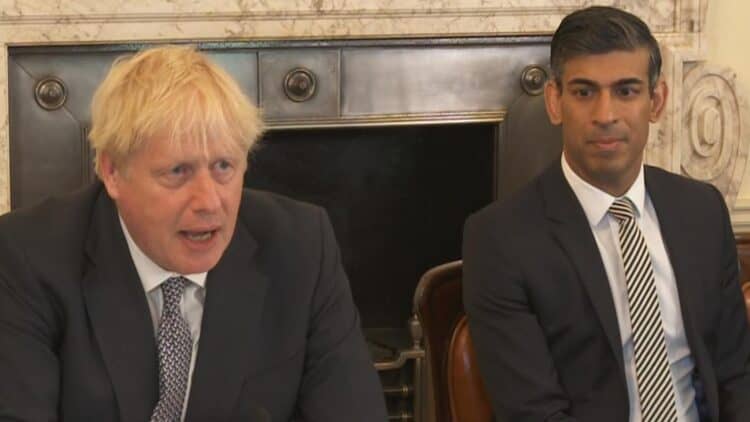In a surprising move, Boris Johnson has taken aim at Rishi Sunak’s latest Brexit deal with the DUP, expressing concerns that it may tether the UK to EU trade rules in the future. The Sunak government unveiled adjustments to streamline the movement of goods from Great Britain to Northern Ireland, aiming to address unresolved issues from Johnson’s previous Brexit agreement.
Despite the modifications being essentially an extension of Johnson’s deal, Johnson, alongside rebellious Tory members, argues that the new arrangements could impede Britain’s post-Brexit “freedom” to deviate from EU regulations. Johnson urged his successor to display the “courage” to distance the UK further from Brussels regulations.
“We must retain the appetite and the courage to diverge from the low-growth high-regulation European model,” said Mr Johnson on X, formerly Twitter.
“We must at all costs avoid a return to anything remotely like the disastrous ‘Chequers’ formula, whereby artificial concerns about the border between Northern Ireland and Ireland are used to keep the whole of the UK in alignment with EU rules.”
Former Brexit negotiator Lord David Frost, believed to be part of a faction plotting against Sunak, echoed Johnson’s sentiments, emphasizing the need to continue diverging from EU policies. The Sunak government’s proposal, outlined in the “Safeguarding the Union” paper, retains the “red lane” for goods moving from GB to NI and the EU single market, while reducing routine checks on the “green lane” for goods staying in NI.
The rebranded “UK internal market system” aims to facilitate the movement of 80% of goods without routine checks. The government promises to amend domestic law to ensure that new EU laws do not automatically apply in Northern Ireland, emphasizing oversight by Stormont. Despite these assurances, some skeptical Tory MPs, including Priti Patel and Sir Jacob Rees-Mogg, question the feasibility of UK divergence without jeopardizing arrangements for Northern Ireland.
Northern Ireland Secretary Chris Heaton-Harris, however, assured in the Commons that the deal maintains the freedoms secured through Brexit and does not reduce the UK’s ability to diverge. Former Northern Ireland Secretary Theresa Villiers expressed concerns and called for thorough scrutiny before rushing the agreement through parliament.
DUP leader Jeffrey Donaldson praised the plan for effectively removing the Irish Sea border for goods. While Sammy Wilson remains critical, accusing the government of following EU rules, legislation for the deal is set to be fast-tracked through parliament to restore Stormont’s institutions.
Downing Street insists that the deal does not require reopening the Windsor Framework agreement with the EU Commission president Ursula von der Leyen. The European Commission expressed approval, with Vice-president Maros Sefcovic stating it meets Northern Ireland’s needs while protecting the single market.
Republic of Ireland’s deputy PM Micheal Martin anticipates no objections from the EU side. Meanwhile, Tory minister Andrea Leadsom dismissed business concerns over costly new checks on EU imports, labeling them the “price you pay” for Brexit. Critics argue that these checks, particularly on food and plant imports, may significantly impact industries and raise prices for consumers.
Why not check out: Post Brexit Controls on Food and Farm Imports Commence, Sparking Industry Concerns







